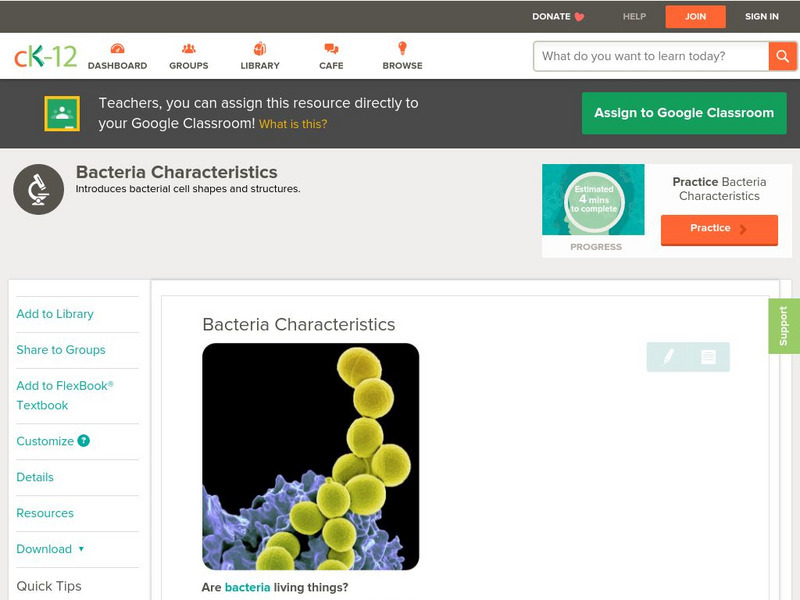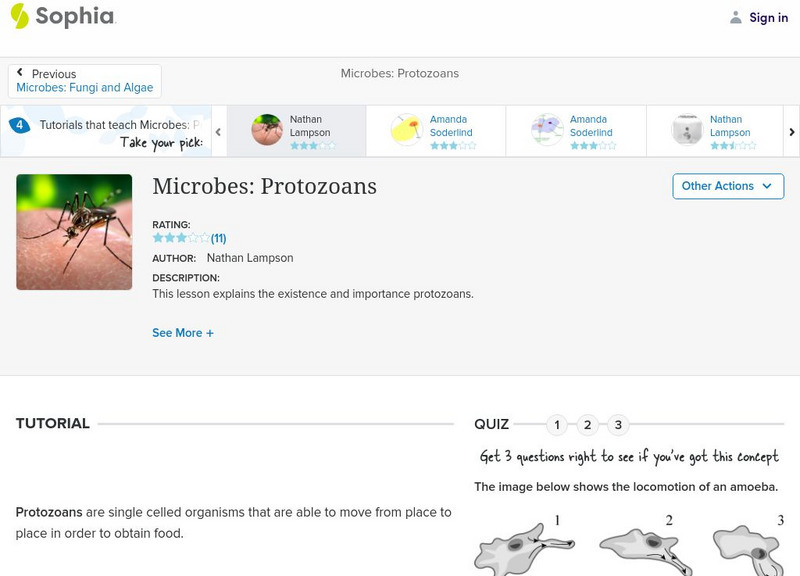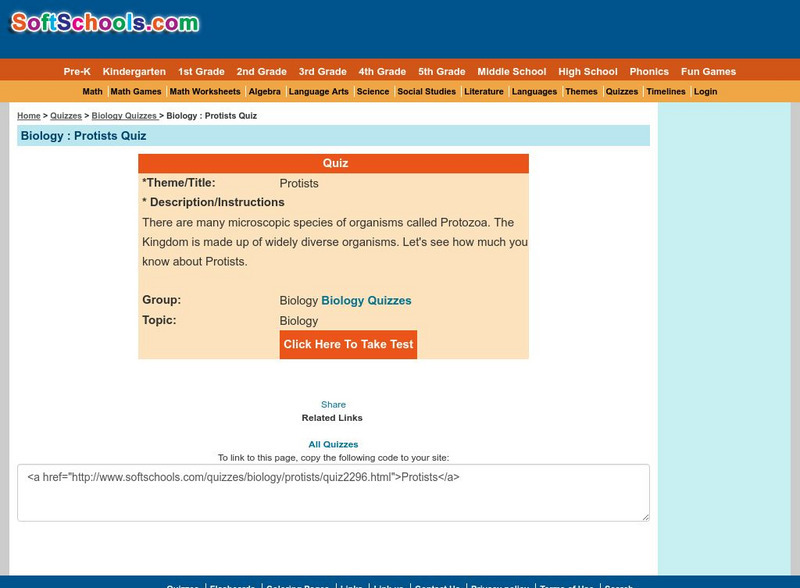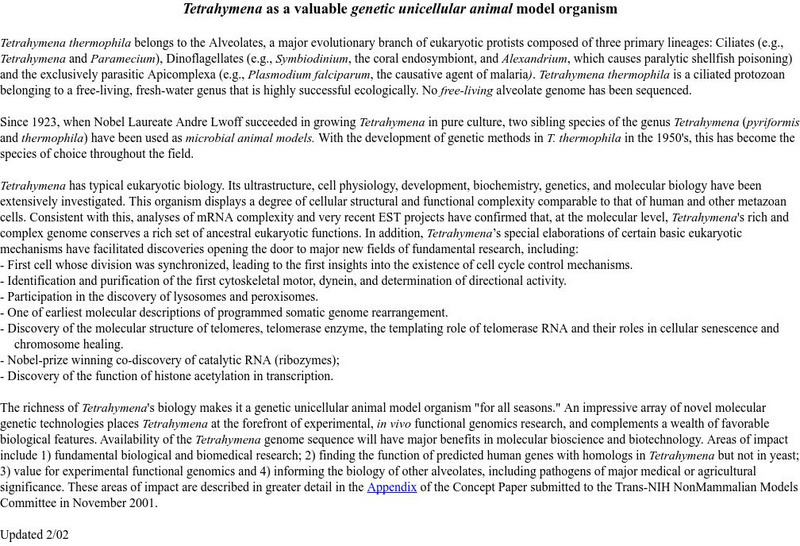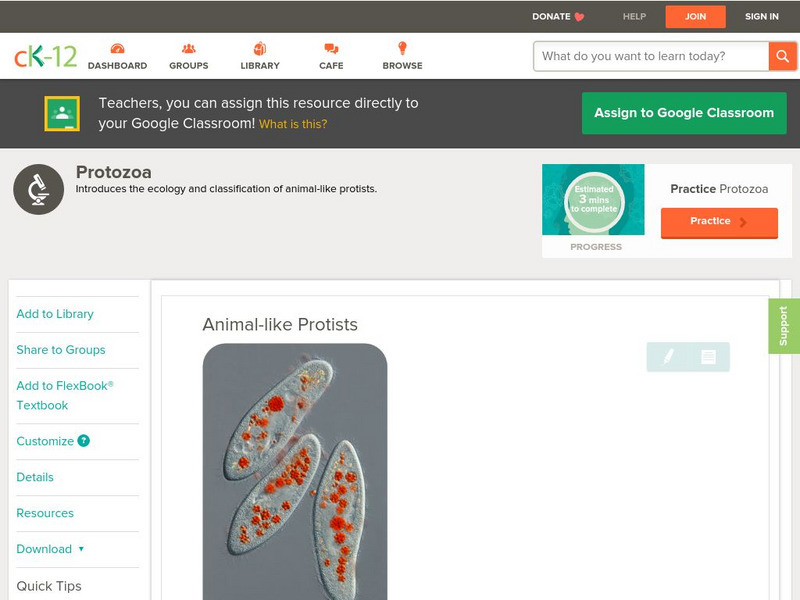University of South Florida
Project Oceanography: Single Celled Organisms [Pdf]
In this lesson, learners explore three kinds of symbiotic relationships involving unicellular organisms. They will also look more closely at the relationship between zooxanthellae and coral, and the importance of nitrogen-fixing bacteria...
Encyclopedia of Earth
Encyclopedia of Earth: Evolutionary Biology: Organism
Article explaining what organisms are, their cellular foundation, and how they get their energy and nutrition. (Published: May 26, 2010)
Khan Academy
Khan Academy: Cell Cell Signaling in Unicellular Organisms
Article takes a look at how unicellular organisms "chat" with one another using chemical signals. It examines yeast mating types, bacterial quorum sensing, and biofilms.
Microscopy UK
Microscopy Uk: Micscape Article Paramecium
Excellent article on a unicellular organism, the paramecium. Includes details on its environment, paramecium types, and environmental importance.
CK-12 Foundation
Ck 12: Life Science: Bacteria Characteristics
[Free Registration/Login may be required to access all resource tools.] Bacteria are the most successful organisms on the planet. They lived on this planet for two billion years before the first eukaryotes and, during that time, evolved...
CK-12 Foundation
Ck 12: Life Science: Bacteria Reproduction
[Free Registration/Login may be required to access all resource tools.] Bacteria, being single-celled prokaryotic organisms, do not have a male or female version. Bacteria reproduce asexually. In asexual reproduction, the "parent"...
Sophia Learning
Sophia: Microbes: Protozoans
This lesson describes single-celled protozoans, highlighting their modes of movement. [46 secs]
Soft Schools
Soft Schools: Protists Quiz
Take an interactive quiz over protists. After completing the quiz, check your score, and then revisit any incorrect question for further review.
BiologyWise
Biology Wise: Life Cycle of an Amoeba
The amoeba is a unicellular protozoan organism that has existed since prehistoric times. Its physical characteristics, life cycle, and metabolic activities are described in this resource.
TED Talks
Ted: Ted Ed: What Is the Biggest Single Celled Organism?
The elephant is a creature of epic proportions- and yet, it owes its enormity to more than 1,000 trillion microscopic cells. And on the epically small end of things, there are likely millions of unicellular species, yet there are very...
University of California
Tetrahymena as a Unicellular Model Organism
Information on Tetrahymena thermophila and why it is an important unicellular organism.
CK-12 Foundation
Ck 12: Plix: Organization of Living Things
[Free Registration/Login Required] In this interactive, explore the organization of living things by correctly organizing the labeled circles.
CK-12 Foundation
Ck 12: Life Science: Animal Like Protists
[Free Registration/Login may be required to access all resource tools.] Animal-like protists are called protozoa. Protozoa are single-celled eukaryotes that share some traits with animals. Like animals, they can move, and they are...
BiologyWise
Biology Wise: Paramecium Reproduction
Describes the characteristics of paramecium and how they reproduce both sexually and asexually.
BiologyWise
Biology Wise: Diatoms Reproduction
Diatoms are a type of algae that reproduces both sexually and asexually. Its characteristics and methods of reproduction are described here.
BiologyWise
Biology Wise: Amoeba Facts
Presents facts about amoebas, including their physical characteristics, reproduction, and classification.
BiologyWise
Biology Wise: Multicellular vs. Unicellular Organisms
Describes the characteristics of unicellular and multicellular organisms and gives examples for each.
BiologyWise
Biology Wise: Unicellular Organisms
A unicellular organism is made of only a single cell. Its characteristics are described and several examples are provided.
BiologyWise
Biology Wise: Amoeba Movement
Explains how an amoeba is able to move by altering the shape of its cell's cytoplasm and shifting between fluid and solid states. The amoeba can also form pseudopodium that allow it to move as well as to engulf prey through phagocytosis.
BiologyWise
Biology Wise: An Overview of the Euglena Classification
Describes the classification, structure, habitat, lifespan, method of reproduction, and diet of Euglena, a unicellular organism.
BiologyWise
Biology Wise: Classification of Amoeba (Ameba)
Describes the characteristics of amoeba and their classification.
Curated OER
Micscape Article: Paramecium
Excellent article on a unicelluar organism, the paramecium. Includes details on its environment, paramecium types, and environmental importance.
![Project Oceanography: Single Celled Organisms [Pdf] Lesson Plan Project Oceanography: Single Celled Organisms [Pdf] Lesson Plan](https://static.lp.lexp.cloud/images/attachment_defaults/resource/large/FPO-knovation.png)



